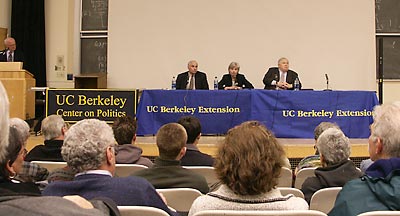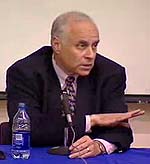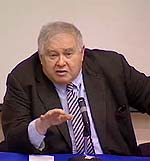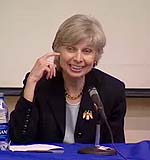 |
Bush forum panelists Michael Nacht, Eleanor Clifton, and Nelson Polsby. |
Assessing George W. Bush: From a "caretaker president" to a "revolutionary" of "missionary zeal"
 Watch
the Webcast: "George
W. Bush — A Midterm Analysis" Watch
the Webcast: "George
W. Bush — A Midterm Analysis" |
BERKELEY - The three panelists headlining an assessment of the 43rd U.S. President may have differed on the details, but overall they agreed that George W. Bush is floating high on a wave of wartime patriotism - one that might easily carry him to victory in the 2004 Presidential Elections.
The two-hour "Bush at War: The 22nd Annual Review of the Presidency," a series sponsored by UC Berkeley's Center on Politics at the Institute of Governmental Studies and UC Extension, took place Monday night, April 21, before a packed lecture hall. Moderated by Gerald Lubenow, the Center on Politics' director, the discussion ranged from how Bush is handling the war on terrorism, Iraq, homeland security, and the economy, to what competition the President faces in the next election.
"An extraordinary achievement"
The war with Iraq dominated much of the first hour, starting with the question Lubenow lobbed to Michael Nacht, dean of the Goldman School of Public Policy and the Aaron Wildavsky Professor of Public Policy. Would the President be able to handle the subsequent peace process as well as he had handled the war?
"I think the Bush administration spent a lot more time preparing for the war than the peace," acknowledged Nacht. Nevertheless, he added, the Bush administration seems determined to make Iraq a showcase for democratic governance in the Middle East: "It sounds melodramatic, but it really could be a very critical moment in American foreign policy. If Bush's dreams are realized, even 0.75 realized, it will be an extraordinary achievement."
 'I foresee a great crisis with respect to Israel-Palestine in the coming months. I think Bush will push hard for Israel to get out of the territories.' -Michael Nacht, Dean of the Goldman School
of Public Policy
|
Nacht played the role of Bush defender, parrying with good humor the other two, more critical panelists - Nelson Polsby, a UC Berkeley political science professor and the coauthor of the seminal "Presidential Elections: Strategies of American Electoral Politics" (now in its tenth edition); and Eleanor Clift, a Newsweek contributing editor assigned to Capitol Hill and a regular panelist on "The McLaughlin Group." (A fourth panelist canceled before the event.) As Polsby observed, the panel was balanced regarding the Iraq war: "The way I hear Michael, he was for it, Eleanor was against it, and I was on the fence all the way."
Both Polsby and Clift declared the United States no safer from terrorism after the fall of Saddam Hussein's regime. Clift wondered where the promised weapons of mass destruction were, accusing Secretary of Defense Donald Rumsfeld of "moving the goal posts" when Rumsfeld suggested that these weapons had been spirited into Syria. She also argued that if the weapons did remain in Iraq, in the current chaos they were even more likely to fall into the wrong hands now that U.S. arrogance has enraged the Arab world. "General Franks went over there with all his military entourage and sat like colonial kings in one of Saddam's palaces," Clift said. "Now that may make Americans feel terrific-"
"Hey, it was Passover!" interrupted Polsby, to a roar of outraged laughter.
"Well won't that just make them feel great in the Arab world!" retorted Clift. "That's just humiliating to Arabs . Are we safer after this war? I don't think so."
Nacht disagreed, contending Iraq had indeed posed a bigger threat before the war. Drawing on his 1994-97 tenure as director of the U.S. Arms Control and Disarmament Agency, working on nuclear arms reduction and missile defense negotiations with Russia and China, Nacht said that within Iraq, various nongovernmental, i.e. terrorist, groups had espoused the use of violence against the U.S. "They were receiving training and materiel support and assistance of various kinds from the Iraqi government," he said. "Some will be found and some won't. Iraq has had for many years very large stockpiles of biochemical weapons. If that is not true, then half the intelligence community should be fired."
He rattled off the many briefings, photographs of convoys and intercepted communications - not always passed along to United Nations weapons inspectors because the U.S. suspected the inspectors were leaking them to the Iraqis - that had led him to believe the threat was real. "Are we safer as a result? Yes and no. Iraq is no longer a sanctuary for those groups, but we have not dampened their desire to hurt us."
"Wrapped in the flag"
The panelists' opinions were more closely aligned on the origins of Bush's current popularity ratings. Before the September 11 attacks, said Clift, "Bush was widely regarded as one-term caretaker president. He had one bold agenda item, which was big tax cuts, and the country didn't seem all that enamored of him." But after 9/11, Bush felt the "hand of God" upon him, as Ronald Reagan had following the assassination attempt on his life, she said. "Fighting the war on terrorism, ridding the world of rogue states, has taken on a missionary zeal in this administration," Clift argued, adding that the traumatized U.S. seemed prepared to give Bush a long leash in fighting this nameless enemy.
 'Undoubtedly Condi Rice's capacity to explain things simply [to Bush] is the pure product of her having taught at Stanford all these years.' -Nelson Polsby,
UC Berkeley political science professor |
And Bush's chief campaign strategist Karl Rove has plans for the extra leather. The President's best chance at getting re-elected "is if he stays wrapped in the flag," said Polsby. If he were somehow to fall off the wartime patriotism bandwagon, "all the public opinion surveys that I've seen on all other issues suggests that he's quite vulnerable . We all do recall that his father had over 90 percent approval ratings in 1991 and lost the 1992 election. The Bush people know this; I don't know what Bush knows," Polsby quipped. "Certainly Karl Rove knows that he's got to keep Bush wrapped in the flag - pinned with a diaper pin."
Nacht agreed that Bush would likely play the wartime leader role to the hilt through the next election, a role which he said appeals to the "red states," or those that voted for Bush in the 2000 election. "He walks around with a bit of a swagger, he speaks in very elementary terms, he wears a windbreaker. I think a lot of Americans think he is the physical leader in a wartime situation," Nacht said carefully.
Clift and Polsby suggested that Rove and Bush's other advisers were manipulating Americans' perception of threat in order to distract from domestic problems such as the economy. "Bush gets a lot of credit for his focus and candor," said Clift, "but he has been anything but candid about this war. He refuses to put any dollar figure on the aftermath, he refused to say we were going to war until the very last minute . and this is the first war where the wealthy have been asked to do less." She sniped, "I guess I missed the Oval Office address when he said it's going to be the poor, the elderly and children whose services are going to be cut so we can afford the reconstruction in Iraq."
Polsby lambasted Bush's abandonment of the Kyoto Accord, shutdown of stem-cell research, "and a host of issues in which the Bush administration is taking the ignoramus's position." He also innocently asked Nacht if he thought the proposed $750 billion tax was appropriate. Nacht admitted, "Yeah, I actually don't fully understand that .. I simply don't understand in economic terms, and even in political terms, maybe he's playing to the base? But I guess I have to believe that the fundamental premise behind that is the honest belief is that supply-side economics really works. They've convinced me that they're convinced-"
"Ah, one of those faith-based programs!" interrupted Polsby.
 'I think Bush is more his mother's son than his father's, and Barbara Bush is a famous grudge-keeper. It's going to be very difficult for Bush to reach out at all to France and Germany. ' -Eleanor Clift, Newsweek contributing editor
|
Bush vs. the "ethnic Northern liberals"
When Lubenow asked Clift to handicap the Democratic hopefuls for 2004, she said that while Joe Lieberman and John Edwards couldn't be counted out, she thought Senator John Kerry of Massachusetts had better commander-in-chief credentials. She saved her real enthusiasm, however, for Vermont Governor Howard Dean, a physician who also belongs to the National Rifle Association. "He's a lot like George Bush - a blueblood, grew up on 5th Avenue and the Hamptons, went to Yale a few years behind Bush, but took entirely different messages out of the 60s. I take him seriously."
Nacht agreed that Dean was running strong in these early days of the race, but cautioned that while activists like Dean tend to be very critically important in early primaries like Iowa's and New Hampshire's, if Dean actually won the nomination, "I think he would lose very badly to President Bush in a general election unless there was almost an economic collapse." To explain, he said that "the constant nomination by the Democrats of ethnic northern liberals is a shortcut for continuous Republican victory . The only way the Democrats can win in a two-person race is if there's a southerner or someone who can dip into the Republican strongholds in the south. That was very critical to Clinton, and of course it was helped by Perot."
Bold, reckless, ambitious, or paranoid?
Near the end of the forum, an audience member asked whether the panel thought that this was the most radical administration of the last 50 years.
"I'm going to say something you're really not going to like," said Nacht to the crowd that had been enjoying Polsby's Bush barbs. "I think this President, with all the limitations he may offer, is a revolutionary. And we're going to find out how successful he is. But I think [Bush's advisers] are as bold, some might say reckless, and as ambitious - some might say paranoid - as any administration we've seen. They're not interested in compromise or splitting the difference, they know what is right, they think we have the cards to win the game, and they're going to play them now."
Retorted Clift, "Democracy in Iraq could very well mean an Islamic government, and if there were elections tomorrow in Saudi Arabia, Osama Bin Laden would probably win. I don't know if that's in U.S. interests, but they seem willing to roll the dice."
A Webcast of the "Bush at War" forum will be available April 23.

